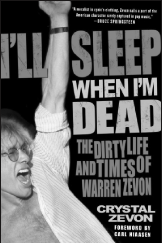By Erik Mattox
Rock biographies always seem to have some biased agenda. Either they’re a literary vehicle for revenge, as in Tina Turner’s bio, “I, Tina” or an excuse to twist facts to support the author’s own opinions, like Geoffrey Giuliano’s “Blackbird: The Life & Times of Paul McCartney.
“I’ll Sleep When I’m Dead: The Dirty Life And Times of Warren Zevon,” written by Crystal Zevon, is neither. By telling her ex-husband and lifelong friend’s story through almost 90 interviews with family (son, Jordan and daughter, Ariel), close friends (Jackson Browne, Billy Bob Thornton) and colleagues (Bruce Springsteen, Bonnie Raitt), including thoughts from Warren’s own diaries, Crystal paints Zevon’s life with a broader stroke, illustrating all sides of this enigmatic rock star: the good, the bad and the very ugly.
The genesis of how this book came about goes back to Zevon’s early lean years, after his 1969 debut, “Wanted Dead Or Alive” flopped and his songwriting royalties were scarce. As Crystal recently explained over lunch at the Moondance Diner, “Warren and I, when we were together, always talked about writing his book. Before he even did the first Asylum album [‘Warren Zevon’], the two of us would sit down and write out chapters. Just kind of as something to do. So in some ways, when he asked me to do it, I should have expected it. I didn’t. I was very surprised”
Through lots of good fortune, in which Warren put much stock, he secured a record deal with help from Jackson Browne, and released a critically lauded self-titled LP. One album later, he struck the pop charts with his only Top 40 hit, “Werewolves of London,” providing the theme song for many Halloweens to come. His personal life was just as bright with the birth of his daughter, Ariel. (Warren also had a son, Jordan, from a previous marriage.) But his success was stymied by his out of control alcoholism and abusive ways. His story was fast becoming a VH1 Behind The Music special (and in lesser hands, this book could have fallen prey to that as well). Instead it was just the beginning of a long career, in which Warren never stopped working or being eccentric.
In the book former girlfriend and Rolling Stone writer, Merle Ginsberg recalls, “His huge outing for the day was to the grocery store, and he was so superstitious that he would go up and down the aisles and he’d say, “Get a carton of milk, but make sure it’s a lucky one.” I’d come back with milk and he’d say, “That’s not lucky. You didn’t get the lucky one.”
Looking to right a sinking ship of divorce, career stagnation and spiraling debts, he finally got sober in 1986 and began relentlessly touring and releasing new work every few years. Ironically, even though VH1 passed on telling his rock-bottom story, they jumped at the chance to document his final recording, “The Wind.”
Through this oral history, Crystal does an exceptional job showing insight into this incredibly tortured yet immensely talented musician. Quotes from contemporaries like David Crosby — who notes in the book “Very few people have an ability to write songs that are mocking, wry and loving all at the same time” — show a man who was respected by his peers but who felt uncomfortable by their praise.
One just can’t help but marvel at the varied and random experiences in this guy’s life:
He drew lyrical inspiration from many great authors and even the occasional tourist brochure (“Seminole Bingo”). He took musical lessons from Igor Stravinsky and wrote a hockey song with Tuesdays With Morrie author, Mitch Albom. He got his touring and arranging chops by playing for the Everly Brothers. He filled in for Paul Shaffer and was a frequent guest musician on Late Night with David Letterman, who himself was a lifelong admirer. And yet most of the world only knows him as the guy who “saw a werewolf drinking a pina colada at Trader Vic’s.” Hopefully this bio will change that.





































